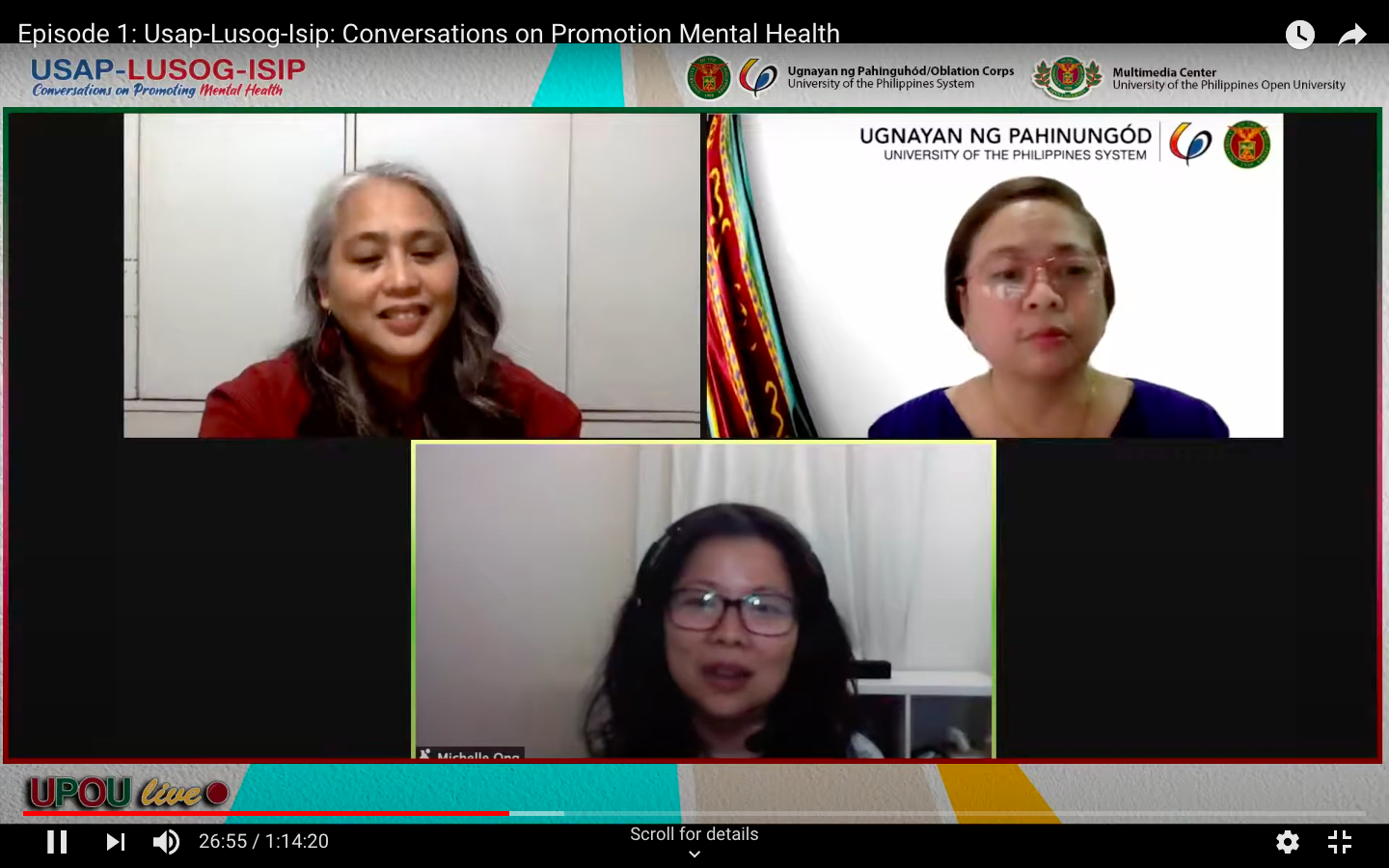
Dr. Dinah Palmera Nadera (left), Assistant Professor Queenie Roxas-Ridulme (right), and Associate Professor Michelle Ong (bottom) engaged in a discussion on promoting and protecting mental health.
The Ugnayan ng Pahinungód University of the Philippines (UP) System together with the University of the Philippines Open University (UPOU) Office of Ugnayan ng Pahinungód and the UPOU Multimedia Center presented the first episode of the The Ledivina V. Cariño Forum Series entitled “Usap-Lusog-Isip: Conversations on Promotion Mental Health” on 12 July 2021 from 6 pm to 7 pm.
Dr. Dinah Palmera Nadera, Pahinungόd System representative to the Pahinungόd Committee on Psychosocial Emergency Services (CoPES) and the Resident Psychiatrist of the University Health Service of UP Diliman, served as the resource person. She was joined by Assistant Professor Queenie Roxas-Ridulme, Pahinungόd Open University representative to the CoPES and the Program Chair for Master of Arts in Nursing (MAN) of the UPOU Faculty of Management and Development Studies, as the moderator. Associate Professor Michelle Ong, Pahinungόd Diliman representative to the CoPES and Chair of the Department of Psychology, College of Social Sciences and Philosophy in UP Diliman, served as the event’s host.
Dr. Nadera began the discussion by defining what lusog-isip or mental health really is. She defined mental health as “a state of health that enables a person to recognize one’s strengths and weaknesses, to address one’s daily needs, to survive through the challenges in life, to be productive, and to have a sense of purpose, among others.” She also stressed that most of us have such qualities but we don’t often talk about them; instead we tend to focus on what is lacking or absent from our state of mind, thereby highlighting insanity and other mental disorders. She further shared that health, according to the definition from World Health Organization (WHO), is not just the absence of diseases or infirmity but also includes mental health, psychological well-being, and spiritual health, to name a few.
To protect our mental health and to stay mentally healthy, Dr. Nadera emphasized the role of different forms of hygiene in our daily lives that include information hygiene, money or financial hygiene, social hygiene, brain hygiene, food hygiene, spiritual hygiene, and so on. She cited that information hygiene, for instance, protects our mental health particularly during the pandemic when a lot of false information spreads on the Internet adding anxiety and stress to everyone. On the other hand, money or financial hygiene encourages us to save by identifying essential items from non-essential items when making a purchase. Regarding social hygiene, Dr. Nadera underscored the importance of our relationships particularly intergenerational relationships and interconnectedness with one another citing relationships with our parents and grandparents as examples.
The impostor syndrome was also tackled in the discussion. Dr. Nadera compared impostor syndrome to false humility in the sense that the person with the syndrome pretends to be humble despite having exceptional attributes and abilities. She clarified that according to research, people resort to this as a mechanism to protect themselves from embarrassment in case they commit errors or mistakes. She was also quick to note that this is not a disease but it has something to do with mental health. To sum up her talk, Dr. Nadera emphasized that there is no health without mental health and that mental health stands beyond a person; it is an investment for national development.
Assistant Professor Ridulme, on the other hand, affirmed the importance of self-awareness in maintaining mental health by highlighting the significance of knowing oneself, especially one’s strengths and weaknesses. She also recognized the role of teachers in promoting and protecting the mental health of students by being innovative and able to come up with new strategies to encourage them to socialize as well as learn online. For working professionals, she suggested having a 15-minute break and engaging in simple exercises like stretching or walking every 1 or 2 hours in order to be able to focus and concentrate. She also recommended that parents set up guidelines to regulate their children’s access to the Internet and Wifi connection. In addition, she encouraged everyone to let the elders feel their self-worth and to increase their self-esteem. She reminded the attendees to focus on good news instead of the bad and sensationalized news.
Associate Professor Ong, on her part, realized how crucial the role of parents in promoting and protecting their children’s mental health. Regarding workplace issues, especially if the employee is no longer happy with the company, she recommended seeking help from the Human Resources department to consult and engage in dialogue or a conversation. She also added that other options like trying “legal avenues” are also available.
Professor Grace Aguiling-Dalisay, Director of the Ugnayan ng Pahinungόd System and Chair of the Pahinungόd CoPES, closed the discussion by sharing that the program is a way of giving recognition to Dr. Ledivina V. Cariño who was the first founding System Director of Pahinungod. Dr. Cariño was a University Professor and Professor Emeritus and taught at the College of Public Administration and Governance of UP Diliman. Dr. Dalisay advised the viewers that, to maintain one’s mental health, we need to observe and practice the different forms of hygiene and we need to know ourselves particularly our strengths and weaknesses rather than focus on what is lacking or absent in us.
The episode can be viewed again in UPOU Facebook page, UPOU Networks site, and UPOU YouTube channel.







